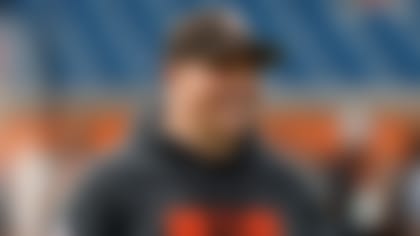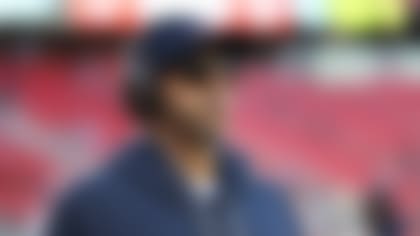Roger Goodell better have the goods.
Somewhere in the 50,000 pages of documents related to the Saints bounty program better be some compelling evidence that it was much more organized and way more vicious than anything the NFL had ever seen. Otherwise, the punishment he's doled out already has exceeded the crime, and the commissioner's credibility on two of the signature issues of his tenure - player safety and the integrity of the games - will suffer a hit he can barely afford. Because if the players believe Goodell is more interested in burnishing his tough-guy reputation and insulating the league from further liability on safety concerns than he is in genuinely pursuing their best interests, look out. All the pushback from all the previous disciplinary cases combined will seem like a nudge.
Saints linebacker Jonathan Vilma filed an appeal Monday over his season-long suspension that repeated several points the players' union filed in grievances last week; most important, perhaps, that the NFL has failed to present evidence of widespread involvement in a cash-for-hits program designed to injure opposing players, including the allegation that Vilma was one of the ringleaders. Three teammates were also suspended for varying lengths of time: Saints defensive end Will Smith, for four games; DE Anthony Hargrove, now with Green Bay, for eight games; and linebacker Scott Fujita, now with Cleveland, for three games. The NFLPA also informed the league it was reserving the right to appeal their cases after a jurisdictional issue is ironed out.
Fujita, who is also a member of the union's executive committee, emailed a statement to The Associated Press claiming, "I've yet to hear the specifics of any allegation against me, nor have I seen any evidence that supports what the NFL alleges. I look forward to the opportunity to confront what evidence they claim to have in the appropriate forum. I have never contributed money to any so-called `bounty' pool, and any statements to the contrary are false. To say I'm disappointed with the League would be a huge understatement."
The union made some of the same claims soon after Goodell announced the players' suspensions last week, with Vilma's lawyer, Peter Ginsberg, going so far as to call his client's one-year suspension "perhaps irrational."
The NFL fired back that it shared plenty of evidence in its voluminous file, and even brought in a former federal prosecutor last winter to oversee its handling of the case. Mary Jo White, who is now in private practice but previously was the United States attorney for the Southern District of New York, said in response to union claims last week that the league repeatedly shared details of the investigation with the NFLPA.
But NFLPA outside counsel Richard Smith said, "It's important to note that nothing Mary Joe White said in her conference call was new or gave any evidence or insight. It was very, very improper for the league to hire a third party and then have a news conference to trumpet their findings."
"They did so instead of allowing the players' association and its lawyers to assess the evidence ourselves," Smith added. We have been asked to accept what is being claimed by the NFL without seeing any credible evidence of what they are claiming."
That's hard to imagine, considering the harsh penalties Goodell already imposed on the Saints hierarchy without so much as a peep of protest. He earlier suspended Saints coach Sean Payton for a year, general manager Mickey Loomis for eight games, assistant coach Joe Vitt for six games and former defensive coordinator Gregg Williams - singled out as the architect of the bounty program - was suspended indefinitely.
The club also was fined $500,000 and docked two second-round draft choices this year and next.
In taking those actions, Goodell has argued he was acting to protect the players. But many of his critics noted that the commissioner's previous public support for an 18-game schedule undermines the very concept. And they worry if all the focus on the so-called illegal hits that result from bounty programs is designed to distract attention from the all-too-legal hits that are essential to the game - and the reason the league is facing dozens of lawsuits involving more than 1,500 former players contending it failed to address the dangers of head trauma for years.
Goodell understands no matter how he tackles those issues, he's walking a fine line.
"In my position, or any job like this, you have tough decisions to make," Goodell said recently. "I know I won't be able to please everyone ... that is not what I need to be concerned with. What is good for the game is what I need to be concerned with."
Jim Litke is a national sports columnist for The Associated Press. Write to him at jlitke(at)ap.org and follow him at Twitter.com/JimLitke.



